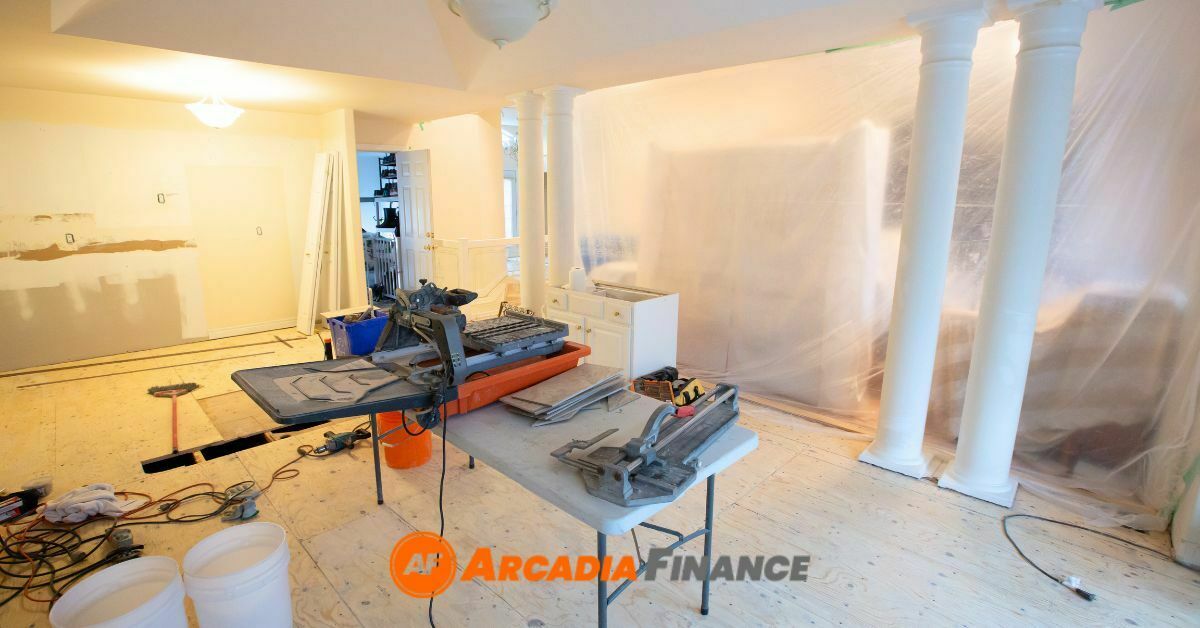
House flipping refers to the process of purchasing a property, renovating it, and selling it at a profit. This concept has gained popularity in South Africa as more individuals seek investment opportunities and income-generation methods.
Why House Flipping is Popular
House flipping has seen a rise in popularity in South Africa due to several factors. Firstly, the country boasts a robust real estate market with a growing demand for affordable housing. Additionally, the escalating cost of living has made it challenging for many individuals to afford their own homes. House flipping presents a viable solution by enabling people to acquire a property, renovate it, and subsequently sell it at a potentially lower price than the current market value.
The Benefits of House Flipping
The benefits of house flipping are plentiful. Firstly, it can be a profitable business venture, with successful flips yielding substantial profits. It provides an avenue for individuals to invest their money and generate passive income. Additionally, it offers opportunities for acquiring new skills in areas such as construction, design, and real estate marketing.
The Risks of House Flipping
However, it is crucial to acknowledge the inherent risks associated with house flipping. Engaging in this activity demands a significant investment of time, money, and effort, and there is always the possibility that the property may not sell or the renovations may not yield the desired results. Legal issues, such as contractor disputes or zoning laws, pose potential risks.
Understanding the South African Real Estate Market
The South African real estate market is presently experiencing growth, with an increasing demand for affordable housing. This growth can be attributed to factors such as the country’s expanding population and the rising cost of living. The market’s dynamics are also influenced by elements like interest rates, economic conditions, and the availability of financing.
Market Trends and Forecast
Market trends and forecasts play a pivotal role in determining the success of a house flip. For instance, if there is a strong demand for affordable housing in a specific area, it may be relatively easier to sell a renovated property at a profit. Conversely, if there is an oversupply of similar properties in the market, finding a buyer may prove more challenging. Staying updated on the latest market trends and forecasts is crucial, allowing for adjustments in your strategy accordingly.
The Importance of Location
Location holds immense significance in the success of a house flip. Properties situated in desirable areas are more likely to sell quickly and at higher prices, whereas properties in less sought-after locations may pose greater difficulties in finding buyers. Thoroughly researching different neighborhoods and areas in South Africa is essential to identify those likely to experience high demand.
The Different Types of Properties to Flip
There are various types of properties suitable for flipping, including single-family homes, townhouses, and apartments. Each property type presents its own set of challenges and benefits, necessitating careful research to determine the most suitable fit for your investment strategy. For instance, single-family homes may offer more space and privacy, but they may also demand more time and effort for renovation. On the other hand, apartments may be easier to renovate, but the competition from similar properties may pose challenges in selling them.
» More info: Smart Ways to Finance Home Upgrades!
Finding Properties to Flip
There are various avenues to explore when searching for properties to flip in South Africa. These include real estate listings, online marketplaces, and real estate auctions. It is crucial to thoroughly research each option to determine the most suitable fit for your requirements. Additionally, attending open houses and networking with fellow real estate investors can be valuable in discovering potential properties.
How to Evaluate a Property for Flipping
When evaluating a property for flipping, it is important to consider several key factors, such as its location, condition, and market value. The location should be desirable and conveniently accessible, with proximity to good schools, transportation, and amenities. The property’s condition must also be assessed, including any structural or cosmetic issues that may require attention during the renovation process. Lastly, the market value should be taken into account, as it will determine the potential selling price once the renovation is completed.
Tips for Finding Hidden Gems
Finding hidden gems, or undervalued properties with significant profit potential, is a key aspect of successful house flipping. This can be achieved by researching emerging areas and identifying properties in need of repair. Networking with other real estate investors and attending real estate events can also provide valuable insights into the latest trends and opportunities.
The Benefits of Working with a Real Estate Agent
Collaborating with a real estate agent offers several advantages. Firstly, they have access to a wealth of information and resources, including market data and listings. They possess expertise in negotiating deals, enabling them to help you find the most suitable properties at favorable prices. They can provide valuable advice and support throughout the entire house flipping process, from property discovery to closing the sale. Whether you are a beginner or an experienced house flipper, working with a real estate agent can be a valuable asset.
Financing Your House Flip
There are various options available for financing a house flip in South Africa, including traditional bank loans, private loans, and hard money loans. Each option has its own advantages and considerations, and it is essential to thoroughly research and evaluate each one to determine the best fit for your investment strategy.
Pros and Cons of Each Option
Traditional bank loans offer advantages such as low interest rates and flexible repayment terms. However, they can be challenging to secure, particularly for individuals with less-than-perfect credit. Private loans provide quick and convenient access to funds, but they often come with higher interest rates and fees. Hard money loans offer fast access to funds and are typically less concerned with the borrower’s credit history, but they may entail higher interest rates and shorter repayment terms.
How to Secure a Loan
Securing a loan for your house flip can be a complex process, but there are steps you can take to enhance your chances of success. These include improving your credit score, building a solid financial portfolio, and collaborating with a real estate agent or loan specialist. Additionally, providing a comprehensive business plan that incorporates a budget and a timeline can demonstrate your commitment and competence in successfully completing the project.
Tips for Staying Within Your Budget
Staying within your budget is vital for the success of your house flip. This involves not only managing your expenses but also anticipating and planning for unexpected costs. It is crucial to have a contingency plan in place, such as a savings account or a line of credit, to address any unforeseen expenses that may arise during the renovation process. Additionally, working with a contractor or financial advisor can assist in maintaining financial discipline, optimizing your budget, and maximizing your returns.
Renovating Your Property
Creating a renovation plan is a crucial step in the house-flipping process. This plan should encompass a comprehensive budget, a timeline, and a detailed list of tasks to be accomplished, including obtaining any required permits or approvals. Thorough research and comparison of contractors and materials are essential to ensure optimal value for your investment. Additionally, seeking the assistance of a design professional can contribute to creating a renovation plan that is both functional and visually appealing.
Tips for Staying Within Budget
Staying within budget throughout the renovation process is challenging but vital for a successful house flip. One effective strategy is adhering to the renovation plan and avoiding deviations or additions that are not accounted for in the budget. Comparing prices for materials and labor, as well as negotiating with contractors, can help secure favorable deals. It is crucial to maintain a realistic perspective on the budget and anticipate unforeseen expenses, such as structural repairs or compliance with building codes.
The Importance of Hiring the Right Contractors
Selecting the right contractors is of utmost importance for the success of your house flip. It entails finding experienced, reliable, and cost-effective professionals with a proven track record. Thorough research and comparison of different contractors, including reference checks and license verification, are crucial steps in the hiring process. It may also be beneficial to engage a contractor specializing in house flipping, as they possess in-depth knowledge of the renovation process and its associated challenges.
Common Renovation Mistakes to Avoid
Renovating a property can be complex, and it is vital to avoid common mistakes that can jeopardize your project and profitability. Examples include over-renovating, overlooking necessary permits or approvals, and exceeding the allocated budget. Additionally, compromising on quality or safety should be avoided, as it can lead to issues in the future. Familiarity with zoning laws and adherence to building codes are also essential, and seeking professional guidance is advisable if any aspect of the renovation process is unclear.
Flipping houses requires a keen eye for value, including the costs of essential equipment like generators. Stay informed on the best generator prices to maximise your investment returns. Read our latest article on generator prices for more information.
Marketing and Selling Your Flip
Properly pricing your property is crucial for the success of your house flip. Conduct thorough market research to determine the value of similar properties in the area. Consider factors such as location, condition, and the cost of renovations. Collaborating with a real estate agent or appraiser can provide valuable insights for setting the right price. Overpricing can result in a prolonged time on the market, while underpricing may lead to missed profit opportunities.
Marketing Strategies for Your Flip
Implementing effective marketing strategies is essential to attract potential buyers to your property. Utilize online listings, host open houses, and consider targeted advertising to reach your target audience. Additionally, staging the property can greatly enhance its appeal. By arranging furniture and decor strategically, you can create an inviting atmosphere that showcases the property’s best features.
The Benefits of Staging Your Property
Staging your property offers several advantages, such as attracting a larger pool of potential buyers, increasing the perceived value of the property, and expediting the sale. Thoughtfully staged spaces help potential buyers envision themselves living in the property and recognize its full potential. Staging emphasizes the property’s desirable aspects while minimizing any flaws it may have.
Tips for Closing the Deal
Closing the deal is the final step of your house flip, and it demands careful attention. Be responsive to potential buyers, maintain a cooperative approach during negotiations, and ensure transparency regarding the property’s condition. Collaborating with a real estate agent or attorney can ensure legal requirements are met and safeguard your investment. Lastly, exercise patience and avoid rushing the process, as haste may lead to mistakes or missed opportunities.
About Arcadia Finance
Obtain your loan effortlessly using Arcadia Finance. No application fee, and you can choose from 10 reliable lenders, each following the regulations set by the National Credit Regulator in South Africa.
Legal Considerations for Flipping Houses
To successfully flip houses in South Africa, it is crucial to have a thorough understanding of the country’s real estate laws. This includes familiarizing yourself with regulations pertaining to property ownership, zoning, building codes, and contractual agreements. Additionally, it is important to stay informed about any local or regional laws that may impact your investment, such as taxation, environmental regulations, and homeowner association guidelines.
The Importance of Hiring a Lawyer
Engaging the services of a qualified lawyer can prove invaluable when flipping houses. A lawyer can provide expert guidance on legal matters, including contract negotiations, zoning regulations, and building codes. They will work to safeguard your interests and ensure compliance with all legal requirements. Whether you are a novice or an experienced house flipper, collaborating with a lawyer will help minimize risks and contribute to the overall success of your investment.
Common Legal Mistakes to Avoid
Several common legal mistakes can significantly impact your house flip. These include failing to obtain necessary permits or approvals, overlooking research on zoning laws, and disregarding building codes. Additionally, it is essential to use legally binding contracts and refrain from making false or misleading statements in advertising or marketing materials. Maintaining compliance with the terms of loans or financing agreements is crucial. Avoiding these legal pitfalls will safeguard your project and mitigate potential issues.
Protecting Your Investment
Protecting your investment is paramount to the success of your house flip. This involves adhering to legal requirements, conducting thorough market and property research, and assembling a team of professionals to ensure the safety and security of your investment. It is also prudent to have contingency plans, such as insurance coverage, in place to protect against unforeseen events. Regardless of your level of experience, prioritizing the protection of your investment will contribute to a successful project and maximize your returns.
Conclusion
Property flipping can be a profitable and fulfilling investment venture, but it’s crucial to approach it cautiously and be prepared for the challenges and risks involved. By conducting thorough research, formulating a robust plan, and collaborating with a team of professionals, you can enhance your chances of success and accomplish your objective of flipping houses in South Africa.
FAQs
Property flipping involves purchasing a property, renovating it, and reselling it for a profit. In South Africa, property flipping can be a lucrative investment, especially if thorough research is conducted, the real estate market is understood, and a solid plan is in place.
Property flipping in South Africa entails various risks, such as market fluctuations, unforeseen expenses, and potential delays in renovations. It is essential to be aware of these risks and to prepare accordingly by establishing contingency plans and working with a team of professionals.
Several financing options are available for property flipping in South Africa, including traditional bank loans, private loans, and hard money loans. Each option has its own advantages and disadvantages, and careful research is necessary to determine the best fit for your investment strategy.
When engaging in property flipping in South Africa, it is important to be familiar with real estate laws, including regulations on property ownership, zoning, building codes, and contracts. Additionally, understanding local or regional laws that may impact your investment, such as taxes, environmental regulations, and homeowner associations, is crucial for a smooth process.
Working with a real estate agent offers several advantages. They have access to extensive information and resources, including market data and listings. Their expertise in negotiation can help secure favorable prices, and they can provide valuable advice and support throughout the entire house flipping process. Whether you’re a beginner or an experienced house flipper, a real estate agent can be a valuable asset.
Cheap loan - fast, uncomplicated, trustworthy
At Arcadia Finance you can compare loan offers from several lenders without obligation - free of charge and without any Schufa check. This gives you an overview of your options and allows you to choose the best offer.
Fill out our form now and compare interest rates at over 20 banks - transparently and quickly.

